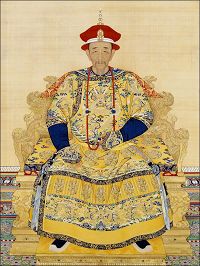(Clearwisdom.net) On September 2, 1679, a strong earthquake took place at noon near Beijing. The earthquake spread through Beijing and six other provinces (Hebei, Shanxi, Shaanxi, Liaoning, Shandong, and Henan), totaling over 200 counties. Numerous city walls, government office buildings, and houses collapsed. There were many deaths and injuries.

Facing this unexpected disaster, Emperor Kangxi took immediate action. First he designated financial support to compensate the victims, then he called on government officers and the wealthy to provide help. Most importantly, he led his officers, from high to low, to look with deep introspection into the various government agencies. First, he humbly examined himself for shortcomings and areas in which to improve. Then he asked his officers to dispense with bureaucracy, conscientiously correct any previous shortcomings, and work hard for the people and the nation.
Within four hours after the earthquake, Emperor Kangxi called various officials--including internal affairs officers, all his minsters, royal family officers, procuratorial officers, as well as prime minsters Ming Zhu and Li Guangdi--to a meeting. He reprimanded some of them for accumulating personal fortunes rather than working hard for the nation. He said they did not remain honest and upright and instead had become greedy and corrupt Emperor Kangxi said if these officers did not correct themselves, they would be punished according to the law, no exceptions.
Two days later, Emperor Kangxi once again gathered his major officials and described six shortcomings he had observed: 1) Officials at all levels accumulated fortunes by extorting wealth from the common people. Such corruption had exacerbated the people's already marginal existence. 2) Many officials even collaborated in order to amass more personal wealth. 3) During the war, soldiers recklessly robbed and killed. 4) Local officials did not report to higher officials the misery that the people were having to endure. In cases of flood and drought, local officials fabricated numbers to get relief but never funneled the benefits to the people in need. 5) The justice department did not handle lawsuits fairly, and many cases remained unresolved for long periods of time. 6) Families of high officials took advantage of ordinary people and unduly influenced how the law was carried out.
Emperor Kangxi told his officials to provide concrete plans for how to remedy the six shortcomings. He specifically emphasized that all their corrective acts would depend on the high officials setting a correct example. This is because when high officials are no longer corrupt, their subordinates will be intimidated and not dare to act otherwise.
Obeying Emperor Kangxi's order, within 10 days the high officials submitted a proposal to eliminate the shortcomings. Their proposal recommended steps that included replacing corrupt officials, banning corrupt officials from government agencies for their lifetimes, to the death penalty. Emperor Kangxi approved this proposal.
Emperor Kangxi took such action after the earthquake because he respected divine power and natural law. Divine power was well accepted in ancient China, and people believed there was a universal law behind everything in nature. Therefore, natural disasters were often considered a warning from heaven. Today we are experiencing many disasters, including SARS, tsunamis, bird flu, and many more. How many people can examine themselves, just like Emperor Kangx did, and take corrective action to comply with heavenly law?
September 24, 2007
Category: Traditional Culture






